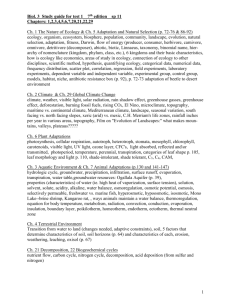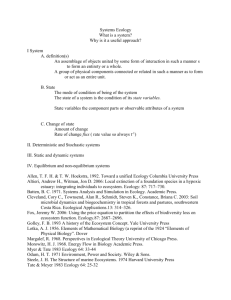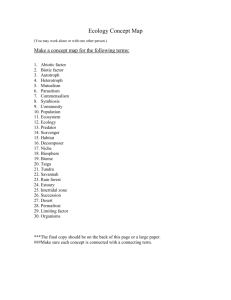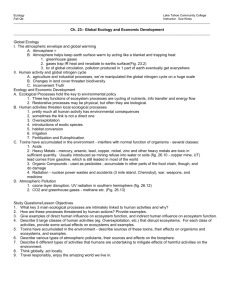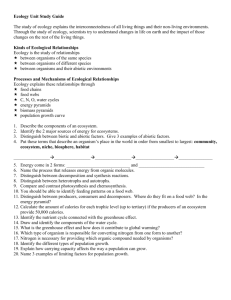HUMAN ECOLOGY THEORY-final
advertisement
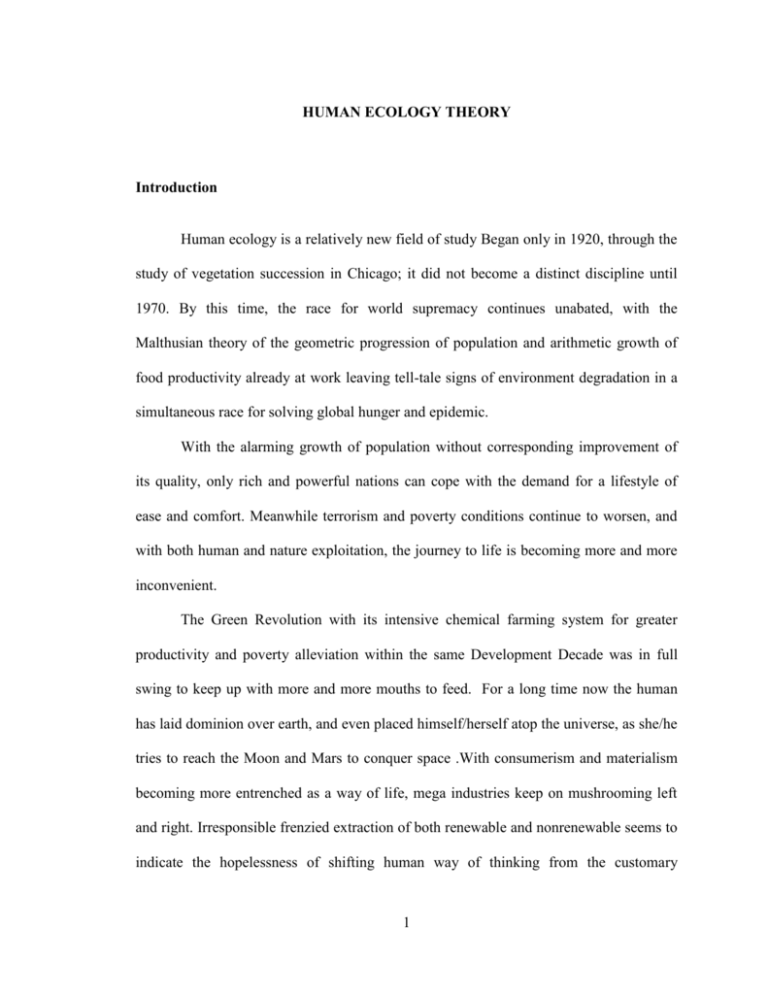
HUMAN ECOLOGY THEORY Introduction Human ecology is a relatively new field of study Began only in 1920, through the study of vegetation succession in Chicago; it did not become a distinct discipline until 1970. By this time, the race for world supremacy continues unabated, with the Malthusian theory of the geometric progression of population and arithmetic growth of food productivity already at work leaving tell-tale signs of environment degradation in a simultaneous race for solving global hunger and epidemic. With the alarming growth of population without corresponding improvement of its quality, only rich and powerful nations can cope with the demand for a lifestyle of ease and comfort. Meanwhile terrorism and poverty conditions continue to worsen, and with both human and nature exploitation, the journey to life is becoming more and more inconvenient. The Green Revolution with its intensive chemical farming system for greater productivity and poverty alleviation within the same Development Decade was in full swing to keep up with more and more mouths to feed. For a long time now the human has laid dominion over earth, and even placed himself/herself atop the universe, as she/he tries to reach the Moon and Mars to conquer space .With consumerism and materialism becoming more entrenched as a way of life, mega industries keep on mushrooming left and right. Irresponsible frenzied extraction of both renewable and nonrenewable seems to indicate the hopelessness of shifting human way of thinking from the customary 1 anthropocentric mode to a cosmpocentric-theocentric mode. Anyway, little do most people realize that our only habitat, the living planet earth of grace and beauty is already languishing and in great peril, together with all of humanity. To be sure, the people's poor attitude towards environment friendly practices and earth care itself as a primordial responsibility of all are putting this very same planet and its life forms truly ready to be annihilated by the environment crisis which continue to threaten continued existence of all continents - global warming, greenhouse effect and climate change, denudation of forests, declining land productivity, desertification, disappearance of many species, the nuclear meltdown in Chernobyl in 1986 which caused death and mutation of many people and animals, production of toxic, solid, and industrial wastes and lack of suitable dump site and poor waste management, poor sanitation practices and global epidemic, no let up in using chemical intensive farming and fishing, as well as ill practices in mining and logging, Physical (air, water and soil), mind (cultism, terrorism, war), and spirit pollution. Today we need moments of reflections on what we should do about our human habitat as it may already be too late to prevent millions of life forms on becoming extinct, and soon earth as a big ecosystem may no longer be able to support life (http://encyclopediathefreedictionary.com/Ecoloav+liistory). Proponent Urie Bronfenbrenner (April 29, 1917–September 25, 2005) was an Russian American psychologist, known for developing his Ecological Systems Theory, and as a 2 co-founder of the Head Start program in the United States for disadvantaged pre-school children. Was born to Russian Jews, Dr. Alexander Bronfenbrenner and Eugenie Kamenetski Bronfenbrenner, in Moscow, Russia. When he was 6, the family moved from the USSR to the United States. Bronfenbrenner attended Cornell University on a scholarship, completing a double major in psychology and music in 1938. After earning an M.A. at Harvard University in developmental psychology, he completed a Ph.D. at the University of Michigan in 1942. Thereafter he entered service in the United States Army as a psychologist. Following a brief stint at the Veterans' Administration following World War II, Bronfenbrenner began teaching. First an Assistant Professor in Psychology at the University of Michigan, he took a professorship at Cornell University in 1948. In the late 1960s to early 1970s, Bronfenbrenner served as a faculty-elected member of Cornell’s. At his death in 2005, Bronfenbrenner was the Jacob Gould Schurman Professor Emeritus of Human Development and of Psychology in the Cornell University College of Human Ecology (http://en.wikipedia.org/wiki/Urie_Bronfenbrenner). Margaret Bubolz received her B.S. in home economics from the University of Minnesota in 1947, her M.S. in extension education from Cornell University, and her Ph.D. in sociology from Purdue in 1963. She joined the Michigan State faculty in 1963 as an Extension program leader in the Upper Peninsula and came to the campus in 1965 as a family life specialist. She later served as department chairperson, teacher, and researcher. She provided leadership to the College of Home Economics when it changed to Human Ecology in 1970. In 1996 she authored a history of the College of Human Ecology to 3 commemorate the Centennial of the College in 1996. She is currently working on a biography of Beatrice Paolucci, internationally renowned home economist and human ecologist and Distinguished Professor at MSU. She has coauthored a published article on the history of home sewing in home economics, from 1870 to 1940, and has spoken widely on the history of home economics and human ecology. She retired in 1991 as Professor Emeritus of Family and Child Ecology in Michigan State University’s College of Human Ecology (http://en.wikipedia.org/). M. Suzanne Sontag, Ph.D. Dr. Sontag was on the faculty of the College of Human Ecology from 1979 to 2006. She taught within the doctoral program in Human Environment: Design and Management, the master's program in Apparel and Textiles, and the undergraduate program in Apparel and Textile Design (ATD). She was also an advisor in the Honors College to ATD majors. Courses she taught at the graduate level included decision processes in design and management, the analysis of clothing theory, and the ecological analysis of textiles and apparel production and consumption. At the undergraduate level, most recently she taught ecology of the global textile and apparel complex and a capstone course in professional development. Dr. Sontag's research scholarship is related to the relationship between clothing and the self. Major contributions have been the development of the Proximity of Clothing to Self Scale that was validated for use with adolescents and older person, the clarification of the role of clothing in the self-system of adolescents, and development of a measure of physical and social comfort of clothing for 4 older persons. Other areas of research have been the study of the relationship of material environments in relation to the quality of life, the measurement of human values, and the development of indicators of sustainable development for handicraft cooperatives. She has worked collaboratively with Dr. Margaret M. Bubolz in the construction of human ecology theory and the development of integrative research methods (https://www.msu.edu/~sontag/). Assumptions/Hypothesis Theories of human interaction should provide a way of making sense of events that have happened in the past, and then allow us to make predictions about what may happen in the future. Human ecology theory is a way of looking at the interactions of humans with their environments and considering this relationship as a system. In this theoretical framework, biological, social, and physical aspects of the organism are considered within the context of their environments. These environments may be the natural world, reality as constructed by humans, and/or the social and cultural milieu in which the organism exists. Human ecology theory is probably one of the earliest theories of the family and yet, it also contains many new and evolving elements that have emerged as we have begun to realize how the natural and human created environments affect our behavior, and how individuals and families in turn, influence these environments. In human ecology, the person and the environment are viewed as being interconnected in an active process of mutual influence and change (http://family.jrank.org/pages/823/HumanEcology-Theory.html) 5 The Origins of Human Ecological Theory The origin of the term ecology comes from the Greek root oikos meaning "home." As a result, the field of home economics, now often called human ecology, has produced much of the contemporary research using this theoretical perspective. Margaret Bubolz and M. Suzanne Sontag (1993) attribute the concept of an ecological approach to the work of Aristotle and Plato, and then to the evolutionary theory of Darwin. They trace the word ecology to Ernest Haeckel, a German zoologist who, in 1869, proposed that the individual was a product of cooperation between the environment and organismal heredity and suggested that a science be developed to study organisms in their environment. Early home economists were major proponents of this theory as their field developed in the early twentieth century applying various disciplines to the study of the family. The theory has since been used by sociologists, anthropologists, political scientists, and economists. This work continues, with the human ecological framework being a major perspective in research and theory development in the twenty-first century. (http://family.jrank.org/pages/819/Human-Ecology-Theory-Origins-Human-Ecological Theory.html) The Family as a System The application of systems theory is a basic tenet of human ecological theory. The family is seen as a system, with boundaries between it and other systems, such as the community and the economic system. Systems have inputs that drive various processes and actions, such as the finite amounts of money or time that families possess. They also have throughputs, which are the transformation processes that occur within the system, 6 such as the exchange of money for the provision of an essential service, such as food, by eating in a restaurant. In addition, systems have outputs, which affect other systems, such the production of waste materials, which are byproducts of activity in the family, being returned to the larger environment. There are feedback loops from the end of the system back to the beginning, to provide both positive and negative comment back into the process and allow the system to adapt to change. In an ecosystem, the parts and the whole are interdependent. Most theorists outline an ecosystem, most particularly a human ecosystem or a family ecosystem, as being composed of three organizing concepts: humans, their environment, and the interactions between them. The humans can be any group of individuals dependent on the environment for their subsistence. The environment includes the natural environment, which is made up of the atmosphere, climate, plants, and microorganisms that support life. Another environment is that built by humans, which includes roads, machines, shelter, and material goods. As Sontag and Bubolz (1996) discuss, embedded in the natural and human-built environments is the socialcultural environment, which includes other human beings; cultural constructs such as language, law, and values; and social and economic institutions such as our market economy and regulatory systems. The ecosystem interacts at the boundaries of these systems as they interface, but also can occur within any part of an ecosystem that causes a change in or acts upon any other part of the system. Change in any part of the system affects the system as a whole and its other sub parts, creating the need for adaptation of the entire system, rather than minor attention to only one aspect of it. 7 There are also systems nested within systems, which delineate factors farther and farther from individual control, and that demonstrate the effects of an action occurring in one system affecting several others. Bronfenbrenner is generally regarded as one of the world's leading scholars in the field of developmental psychology. His Ecological Systems Theory holds that development reflects the influence of several environmental systems, and it identifies five environmental systems: "Microsystem: The setting in which the individual lives. These contexts include the person's family, peers, school, and neighborhood. It is in the microsystem that the most direct interactions with social agents take place; with parents, peers, and teachers, for example. The individual is not a passive recipient of experiences in these settings, but someone who helps to construct the settings. Mesosystem: Refers to relations between microsystems or connections between contexts. Examples are the relation of family experiences to school experiences, school experiences to church experiences, and family experiences to peer experiences. For example, children whose parents have rejected them may have difficulty developing positive relations with teachers. Exosystem: Involves links between a social setting in which the individual does not have an active role and the individual's immediate context. For example, a husband's or child's experience at home may be influenced by a mother's experiences at work. The mother might receive a promotion that requires more travel, which might increase conflict with the husband and change patterns of interaction with the child. 8 Macrosystem: Describes the culture in which individuals live. Cultural contexts include developing and industrialized countries, socioeconomic status, poverty, and ethnicity. Chronosystem: The patterning of environmental events and transitions over the life course, as well as sociohistorical circumstances. For example, divorces are one transition. Researchers have found that the negative effects of divorce on children often peak in the first year after the divorce. By two years after the divorce, family interaction is less chaotic and more stable. As an example of sociohistorical circumstances, consider how the opportunities for women to pursue a career have increased during the last thirty years. Merit/Demerit A basic premise of a human ecological theory is that of the interdependence of all peoples of the world with the resources of the earth. The world's ecological health depends on decisions and actions taken not only by nations, but also by individuals and families, a fact that is increasingly being realized. Although the concept of a family ecosystem is not a precise one, and some of the terms have not been clearly and consistently defined, a human ecological theoretical perspective provides a way to consider complex, multilevel relationships and integrate many kinds of data into an analysis. As new ways of analyzing and combining data from both qualitative and quantitative dimensions of interconnected variables develop, this theoretical perspective will become more precise and continue to enhance understanding of the realities of family life. (http://family.jrank.org/pages/822/Human-Ecology-Theory-Conclusion.html) 9 Bronfenbrenner's major statement of this theory, The Ecology of Human Development has had widespread influence on the way psychologists and others approach the study of human beings and their environments. As a result of his groundbreaking work in "human ecology", these environments — from the family to economic and political structures — have come to be viewed as part of the life course from childhood through adulthood. Each system contains roles, norms and rules which may shape psychological development. For example, an inner-city family faces many challenges which an affluent family in a gated community does not, and vice versa. The inner-city family is more likely to experience environmental hardships, such as teratogens and crime. On the other hand the sheltered family is more likely to lack the nurturing support of extended family. Bronfenbrenner's analysis of the systems such as the microsystem, mesosystem, exosystem, and macrosystem are an integral part of the theory. The microsystem is our most immediate context, and for most children, is represented by their family and their home. Young children usually interact with only one person until they develop and their world expands. The mesosystem is where a child experiences reality, such as at a school or childcare setting. Links between the institutions in the mesosystem and the child's family enhance the development of academic competence. The exosystem is one in which the child does not participate directly, but that affects the child's experiences. This may be a parent's workplace and the activities therein, or bureaucracies that affect children, such as decisions made by school boards about extracurricular activities. Our broadest cultural identities make up the macrosystem. This system includes our ideologies, our shared assumptions of what is right, and the general organization of the 10 world. Children are affected by war, by religious activities, by racism and sexist values, and by the very culture in which they grow up. A child who is able to understand and deal with the ever-widening systems in his or her reality is the product of a healthy microsystem (http://en.wikipedia.org/wiki/Ecological_Systems_Theory) Application to RD Bubolz and Sontag (1993) outline five broad questions that are best answered using this theory, which is helpful in deciding areas where the theory can make a useful contribution to our knowledge. These are: 1. To understand the processes by which families function and adapt—how do they ensure survival, improve their quality of life, and sustain their natural resources? 2. To determine in what ways families allocate and manage resources to meet needs and goals of individuals and families as a group. How do these decisions affect the quality of life and the quality of the environment? How are family decisions influenced by other systems? 3. How do various kinds and levels of environments and changes to them affect human development? How does the family system adapt when one or more of its members make transitions into other environmental settings, such as day care, schools, and nursing homes? 4. What can be done to create, manage, or enhance environments to improve both the quality of life for humans, and to conserve the environment and resources necessary for life? 11 5. What changes are necessary to improve humans' lives? How can families and family professionals contribute to the process of change? (http://family.jrank.org/pages/820/Human-Ecology-Theory-Family-System.html) References family.jrank.org/.../Human-Ecology-Theory-Family-System.html http://www.crystalinks.com /ecology2.html http:// encyclopedia.the freedictionary.com/Ecology+history http://family.jrank.org/pages/822/Human-Ecology-Theory-Conclusion.htm https://www.msu.edu/~sontag/ http://en.wikipedia.org/wiki/Urie_Bronfenbrenner http://en.wikipedia.org/wiki/Ecological_Systems_Theory 12

